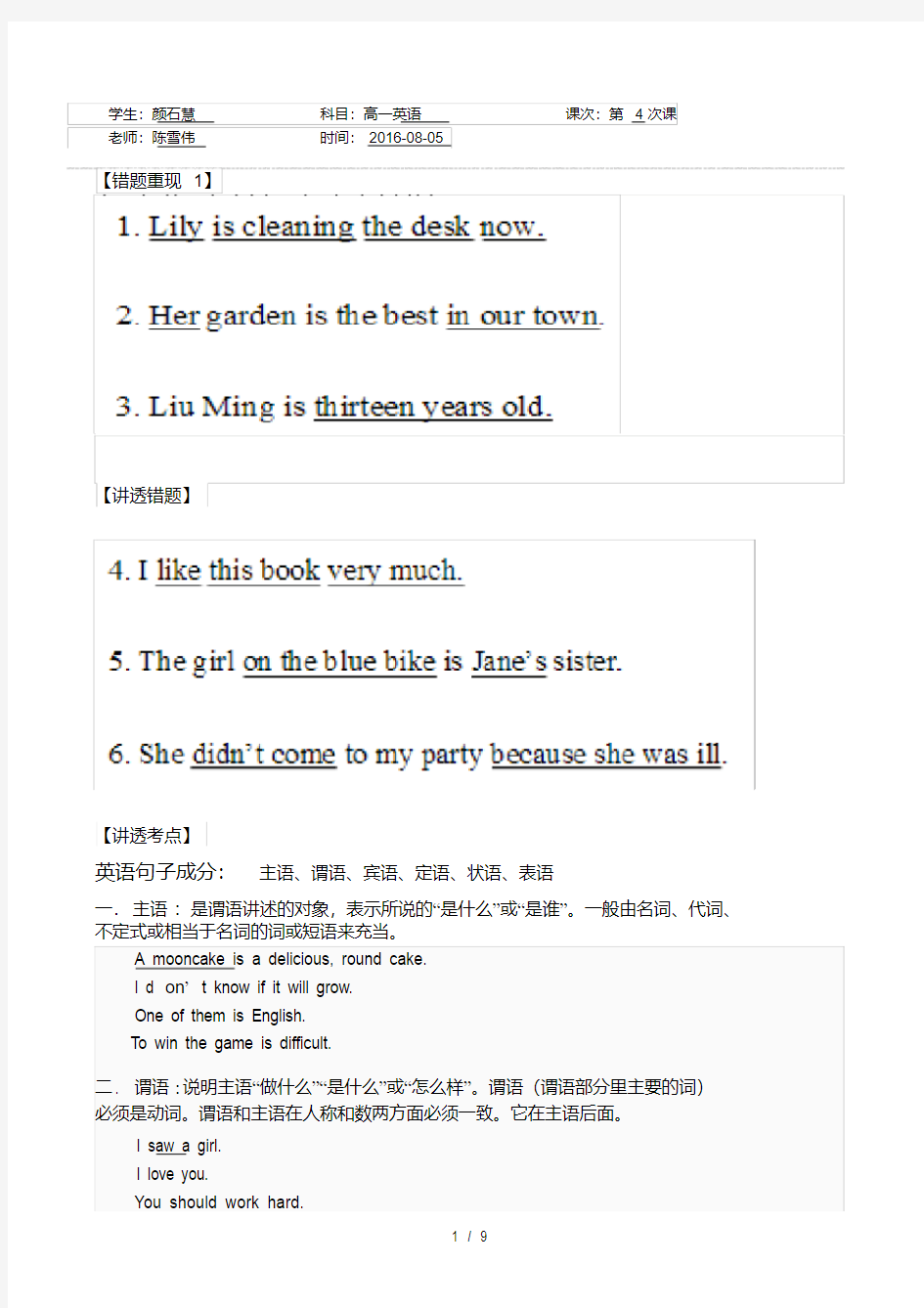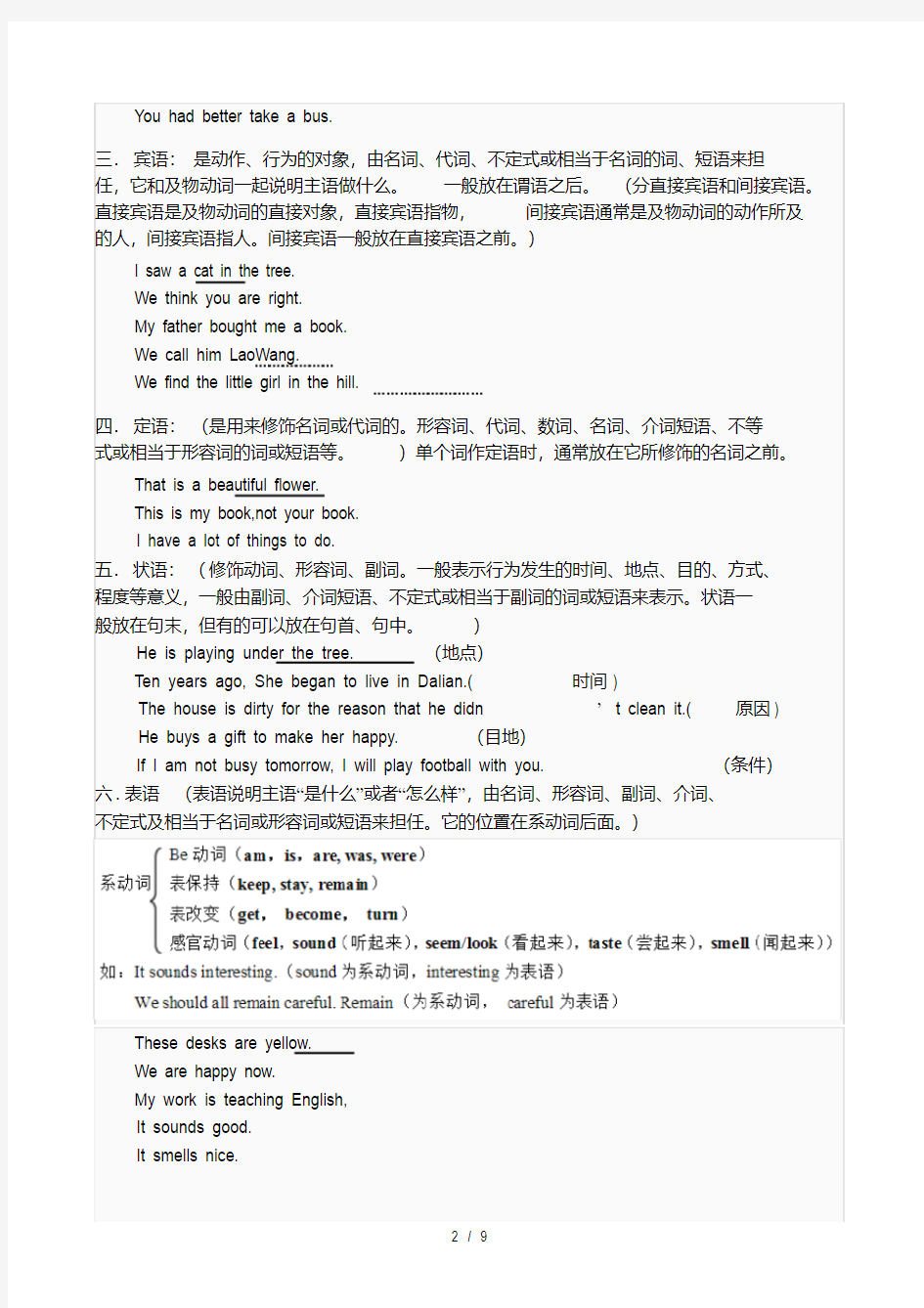简单的英语句子结构五种句型


学生:颜石慧科目:高一英语课次:第4次课
老师:陈雪伟时间:2016-08-05
【错题重现1】
【讲透错题】
【讲透考点】
英语句子成分:主语、谓语、宾语、定语、状语、表语
一.主语:是谓语讲述的对象,表示所说的“是什么”或“是谁”。一般由名词、代词、不定式或相当于名词的词或短语来充当。
A mooncake is a delicious, round cake.
I d on’t know if it will grow.
One of them is English.
To win the game is difficult.
二. 谓语:说明主语“做什么”“是什么”或“怎么样”。谓语(谓语部分里主要的词)必须是动词。谓语和主语在人称和数两方面必须一致。它在主语后面。
I saw a girl.
I love you.
You should work hard.
You had better take a bus.
三.宾语:是动作、行为的对象,由名词、代词、不定式或相当于名词的词、短语来担
任,它和及物动词一起说明主语做什么。一般放在谓语之后。(分直接宾语和间接宾语。直接宾语是及物动词的直接对象,直接宾语指物,间接宾语通常是及物动词的动作所及的人,间接宾语指人。间接宾语一般放在直接宾语之前。)
I saw a cat in the tree.
We think you are right.
My father bought me a book.
We call him LaoWang.
We find the little girl in the hill.
四.定语:(是用来修饰名词或代词的。形容词、代词、数词、名词、介词短语、不等
式或相当于形容词的词或短语等。)单个词作定语时,通常放在它所修饰的名词之前。
That is a beautiful flower.
This is my book,not your book.
I have a lot of things to do.
五.状语:(修饰动词、形容词、副词。一般表示行为发生的时间、地点、目的、方式、
程度等意义,一般由副词、介词短语、不定式或相当于副词的词或短语来表示。状语一
般放在句末,但有的可以放在句首、句中。)
He is playing under the tree.(地点)
Ten years ago, She began to live in Dalian.(时间)
The house is dirty for the reason that he didn’t clean it.(原因)
He buys a gift to make her happy.(目地)
If I am not busy tomorrow, I will play football with you. (条件)六.表语(表语说明主语“是什么”或者“怎么样”,由名词、形容词、副词、介词、
不定式及相当于名词或形容词或短语来担任。它的位置在系动词后面。)
These desks are yellow.
We are happy now.
My work is teaching English,
It sounds good.
It smells nice.
【错题重现2】
找出以下的宾语成分:
【讲透错题】
【讲透考点】
句子结构
(S=主语;V=谓语;P=表语;O=宾语;O1=间接宾语;O2=直接宾语;C=宾语补足语)一.S十V主谓结构|(vi.)
I swim.
主谓
They listened carefully.
My homework has finished.
二.S十V十O主谓宾结构(vt.)
I saw a film yesterday.
主谓宾
They found their home easily
They have taken good care of the children.
三.S十V十F主系表结构(系动词)
Is,look ________________________________________________________+形容词He is old.
主系动表语
The story sounds interesting.
主系动词表语
The desk feels hard
He becomes a teacher.
The trees turn yellow in the autumn.
四.S十V十O1十O2 主谓双宾结构
give,ask_________________________________________________________sb sth He gave me a book.
主谓宾1 宾2
He brought me a pen
He offered me his seat
He got me a chair
五.S十V十O十C 主谓宾补结构
They made the girl angry.
主谓宾宾补
They found her happy that day.
I saw him in. I heard the glass broken just now
【相似题型】
找出以下的表语
【错题重现3】
找出以下定语
【错题重现4】
找出以下宾语补足语【错题重现5】
找出以下状语:
【错题重现6】
找出以下的直接宾语和间接宾语:
【学生解答】
划分句子成分练习题
1.They are working on the farm now.
2.Seeing is believing.
3.All of us like Kobe Bryant very much.
4.She became a doctor in 1998.
5.The book lying on the floor are mine.
6.Suddenly it begins to rain.
7.To catch the train ,I got up early yesterday.
8.I always find her happy.
9.He wonders if I still study English.
10.The letter which I received the day before yesterday was a friend of mine.
同位语
1、一个名词或其它形式,跟在另一个名词或代词后并对其进行解释、说明或限定,这个名词
或其它形式就是同位语。同位语与被它说明的先行词的格要一致,并且前后两项所指相同,句法功能也相同。同位关系紧密时不用逗点隔开;同位语只作补充解释时可用逗点隔开。例如:Mr. Smith, our new teacher, is very kind to us.我们的新老师史密斯先生对我们很
好。(“Mr. Smith”是主语,“our new teacher”是同位语,指同一人。)
Yesterday I met Tom, a friend of my brother's.昨天我遇到了我弟弟的朋友汤姆。(Tom 是宾语, “a friend of my brother's”是同位语,指同一人。)
Mr.Johnson cares for us students very much.约翰逊先生非常关心我们学生。
We students all respect him Mr. Johnson, our English teacher.我们学生都尊重他,
我们的英语老师约翰逊先生。
Qinghai Lake, the largest inland body of salt water in China, lies 3198 metres above sea level.青海湖,中国最大的内陆湖,海拔3198米。
We have everything we need: land, wealth, and technology.我们需要的一切,土地、财
富和技术,都有了。
We Chinese people are brave and hardworking.我们中国人民是勤劳勇敢的。
2、其他成分作同位语
He read all kinds of books, ancient and modern, Chinese and foreign.他读过各种各
样的古今中外的书籍。
People here, men and women, old and young,supported the project.这儿的男女老少都
支持这项工程。
Then we three, Li Ming, Wang Ping and I,begain to prepare for the trip.接着,李明、王平和我三人开始为那次行程做准备。
You may leave it to us two.你可以把这件事交给我们两个。
I’m looking for a job, repairing cars.我在找一份修车的工作。
3、像for example, that is, including, particularly等也可以引出同位语。例如:
He is interested in sports, especially ball games.他喜欢运动,特别是球类运动。
They visited eight cities, for example, London and Paris.他参观了八个城市,如伦敦
和巴黎。
My best friend, (that is to say) Anna, was here with me last night.我最好的朋友,也就是安娜,昨天晚上和我在一起。
4、both, all, each等作同位语要放在助动词、系动词和情态动词之后。例如:
They are both in favor of the plan.他们俩都同意这个计划。
We can all speak English.我们都会讲英语。
Have you each handed in a picture to me?你们每人都交画子给我了吗?
5、同位语有时也可以扯开。例如:
It’s a real-eyeopener__what I have seen today.在这儿看到的真叫我大开眼界那。
It’s worth discussing, the ponit you brought up.这个,你提的问题值得讨论。
He is a complete gunius, that brother of yours.他,你这个弟弟真是个天才。
6、同位语有时相当于一个定语从句。例如:
His only interest in life, (which is)travelling around, has brought him a lot of friends.他唯一的兴趣,到处旅游给他带来了很多朋友。
Alice,(who is) a shy girl, argued heatedly with us.爱丽丝,一个腼腆的姑娘,当时跟
我们辩论是非常激烈。
二.同位语从句
1.作同位语的句子叫同位语从句。被同位语从句解释的名词也叫先行词,同位语从句的先行
词只能是名词或代词,而且名词仅限于belief,doubt,conclusion, fact,hope,idea,information,news,plan,,promise,question,rumour, suggestion,theoryt, thought,tuth,等少数名词:例如:
The fact that he had not said anything surprised everybody.他什么都没说,这个事
实是大家很吃惊。
His suggestion that we should finish the work by the weekend is reasonable.他建议我们在周末前把活干完是有道理的。
2、同位语从句的连接词
1)、that引导陈述句,只起连接作用,其本身无意义;
2)、whether引导一般问句、选择问句和反义问句,意思是“是否”;
3)、who, whom, which, whose, where, when, why, how疑问词引导特殊问句,语序正装,在从句
中担任句子成分,本身有意思。例如:
We expressed the hope that they would come and visit China again.我们都希望他们能
再来中国访问。
I have no idea whether he will agree with us.我不知道他是否同意我们的观点。
I had no idea when the thing happened.我当时不知道那件事是什么时候发生的。
The question how we try out the top player will be discussed next week.如何选拔运动员,这个问题我们下周在讨论。
They haven’t solved the problem what went wrong whith the machine.机器出故障的问
题他们还没解决。
3、同位语从句与定语从句的区别
1)、同位语从句是对先行词的补充说明,它要表明的是一件事、一个物或一个人;而定语从
句是对先行词的修饰限定,它要表明的是一个什么样的事、物或人。
2)、同位语从句的连接词只起连接作用,不具体指代先行词;而定语从句的关系词即在从句
中担任明确的句子成分又明确指代先行词。
3)、同位语从句的先行词和同位语从句可以变成主系表结构;而定语从句不能。
4)、定语从句的关系副词和关系形容词可以化成介词加which/whom的形式;而同位语从句不能。
5)、在when, where, why等连接副词引导的同位语从句中,其先行词不是时间、地点或原因名词;
而在它们引导的定语从句中,先行词必须是时间、地点或原因名词。其它连接词也是这样。例如:Next, let’s talk about the matter who will go to the conference.下面我们来谈谈这个问题,事谁去开会。(同位语从句)
Next, let’s talk about the person who will go to the conference.下面我们来谈谈去开会的人选。(定语从句)
The question is who will go to the conference.问题是谁去开会。(表语从句。这个句
子是正确的,而第二个句子就不能这么变了。)
I have no idea when he was born.我不知道他什么时间出生的。(同位语从句)
I don’t know the time when he was born.我不知道他出生的时间。(定语从句)
